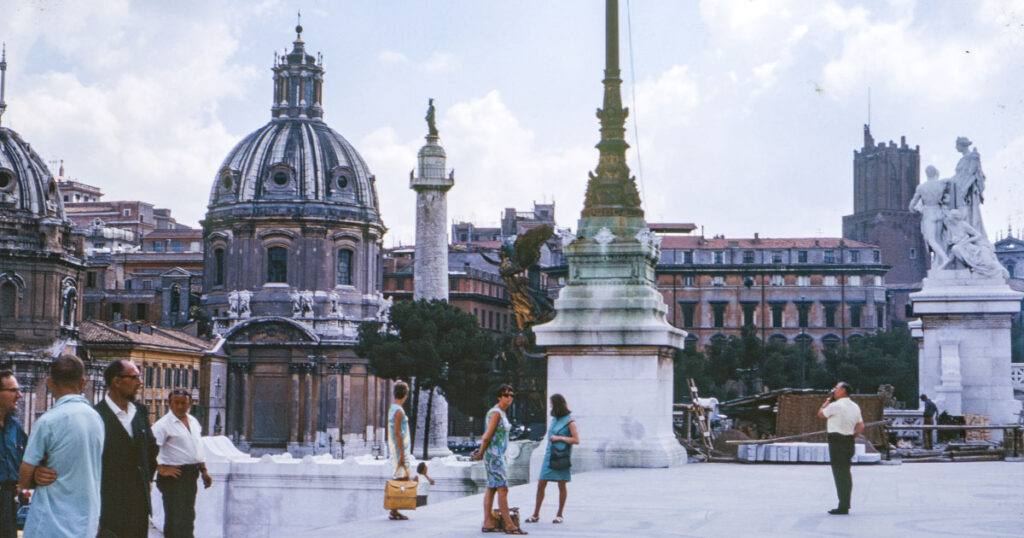
Roman Year: A Memoir by André Aciman; Farrar, Straus and Giroux, 368 pp., $30
André Aciman’s introduction to Italy was a nightmare. His first memoir, Out of Egypt (1994), describes how a prosperous, sophisticated Turkish-Jewish family was forced out of Alexandria in the mid-20th century by President Gamal Abdel Nasser’s campaign to rid Egypt of “Egyptianized” foreign nationals. In the years between 1952 and 1970—from the anticolonial coup that brought Nasser to power, through the Suez Crisis of 1956 that brought the waterway under Egyptian control, to the aftermath of the 1967 war with Israel—Alexandria, the great capital city founded by Alexander the Great in 331 BCE, lost most of the people who ensured its immemorial mix of cultures, languages, and religions. Alexandrians with Greek, Italian, English, Maltese, French, Jewish, and Armenian connections, identified broadly as “European” and “Western,” fled increasingly restrictive educational and economic policies—some with foresight, and others, like the Acimans, only after their situation had deteriorated beyond repair. By the time the 15-year-old André, his younger brother, and their mother boarded a ship from Alexandria to Naples in 1966, only two members of the extensive clan remained in Egypt: the boys’ father and their aunt Elsa, who decamped not long afterward to Paris. Nasser’s punitive financial policies—made worse by the bad faith of the agents who helped the Acimans spirit their savings abroad—left the deaf mother and her two boys destitute, dependent for survival on their relatives in Italy. Roman Year begins as their ship pulls into Naples, and their uncle Claude, now known as Claudio, negotiates the trio’s way out of a Neapolitan refugee camp.
Aciman remembers the ride from Naples to Rome, where Uncle Claude has offered to lease them an apartment, as “the worst hour of my life.” The volatile uncle loses his way in Naples, stops to ask directions of a traffic cop (vigile) in Italian, and then loses his temper in blood-curdling French, no doubt with some Turkish expletives thrown in:
But on reaching an uphill crossroads … and not finding … the directions in any way fathomable, [he] banged both hands on the steering wheel and began shouting, first at the car, then at Naples, which he called a befouled hole filled with urchins and criminals, then let out his fury on the three of us. I was a complete imbecile, he said, with a fourth-grade knowledge of Italian, my brother a simpering toad who might as well be deaf like his mother, and finally my mother, who should have tried a bit harder to help him with directions but naturally couldn’t understand a word because her illiterate parents had put her in the care of a witch doctor who made sure to keep her a deaf-and-dumb mutant condemned to deaf-dumbness for the rest of her deplorable meaningless life.
When Aciman points out that Uncle Claude has driven in the opposite direction from the one suggested by the vigile, the volatile man erupts again, railing against “failures, imbeciles, and that holy idiot—me.”
The apartment turns out to be a walkup on Via Clelia, a side street of the ancient Via Tuscolana, which still leads to the hillside resort town where Cicero famously owned a villa. But in 1966, the poor, working-class neighborhood was a vision straight out of Pasolini: a Fascist-era tenement built to house the people displaced by Mussolini’s archaeological excavations and urban renewal programs, carefully sited far enough away from Rome’s city center to deter any would-be demonstrators. The boys quickly discover that, until they moved into it, their new home had been a brothel.
Eventually, mother and sons board the bus, number 85, that leads from their forsaken outpost into the historical heart of Rome, and the Eternal City casts its spell. Twelve years after the Aciman boys, I commuted aboard the same smelly rattletrap along its enchanted route: past the Colosseum, past the ruddy bricks and grubby white marble of the Forum, past the Emperor Augustus’s colossal Temple of Mars the Avenger, past the marble column carved with the exploits of Emperor Trajan, past the immense marble pile of the King Victor Emmanuel II monument (in those days known as “the typewriter”), past the Renaissance Palazzo Venezia (Mussolini’s former office), past the Baroque façade of San Marcello: an incomparable journey despite the discomforts that rooted it in the all-too-human present. Rome’s beauties of golden light, deep culture, greenery, and glorious monuments clearly helped to heal, but also to sharpen, the loss of everything that was Alexandria for the brothers Aciman. So, too, the very roughness and uncertainty of life on Via Clelia, its grinding awfulness and its flashes of beauty, evidently transformed this perpetually displaced teenage refugee into a writer who has become a consummate poet of sublime, fugitive moments.
Aciman suggests (though not in these exact words) that in many ways, Uncle Claude’s epithet “holy idiot” stuck with him for life. As a Jew of the diaspora, as the child of a deaf woman (who was also a proficient lip-reader), as a refugee from storied Alexandria, he experienced language, place, family, education, sexuality, wealth and poverty, beauty and ugliness in complicated mixtures that have given his writing its poignancy and its versatility, not to mention flashes of wicked humor. Uncle Claude gets his comeuppance when his two nephews notice that he is wearing nothing beneath his wide-legged shorts. The description of what they see on unintentional display is a vendetta as delightful for the reader of this remarkable memoir as the sight itself must have been for the beholders.

